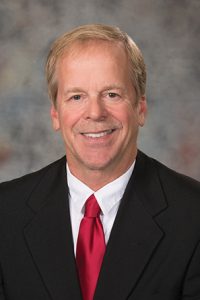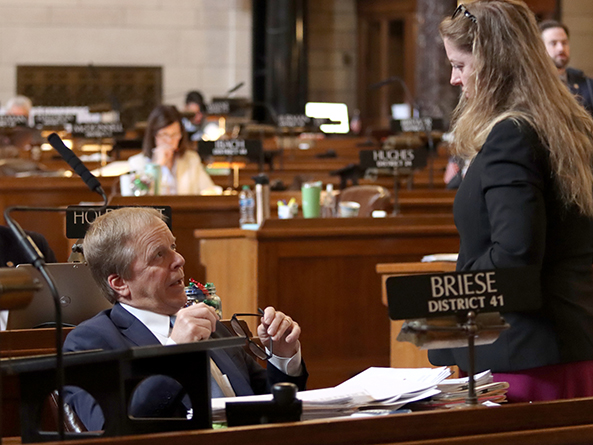Property tax package clears first round
A proposal to direct additional state funding to property tax relief while limiting the amount of property taxes public school districts could collect advanced from general file April 3 after a successful cloture motion.

LB243, introduced by Sen. Tom Briese of Albion, would increase the minimum amount of relief granted under the Property Tax Credit Act, which provides direct property tax credits based on the valuation of a taxpayer’s property. Briese said the act will grant roughly $315 million in relief this year.
A Revenue Committee amendment, adopted 41-0, would replace the bill with an amended version of LB243 and five other bills considered by the committee this session.
The amendment would increase the minimum amount of relief granted under the Property Tax Credit Act to $388 million for tax year 2024. The amount would increase annually, reaching $560 million in tax year 2029. After that, it would grow by the percentage increase in the total assessed value of all real property statewide over the prior year.
The amended provisions of LB242, also sponsored by Briese, would eliminate the 5 percent cap on the Nebraska Property Tax Incentive Act credit’s allowable growth percentage.
The refundable income tax credit, which is intended to offset part of what a taxpayer paid in property taxes to their school district during the previous year, is allowed to grow by the annual percentage increase in statewide real property valuations. Approximately $560 million in credits are available under the program this year, Briese said.
Briese said the proposal is intended to address Nebraska’s out-of-balance tax structure, which collects roughly 30 percent more property taxes than state and local sales taxes each year.
Elkhorn Sen. Lou Ann Linehan, the Revenue Committee’s chairperson, supported the bill. Linehan said she would ensure that LB243 and LB754, which would cut the state’s top individual and corporate income tax rates, would provide equal amounts of property and income tax relief.
Sen. George Dungan of Lincoln agreed with proponents that the Legislature should address Nebraska’s high property taxes. He said the proposal’s cost, which could reach more than $2 billion by 2027, when combined with the proposed income tax cuts, could put the state in a position where it cannot meet its obligations to schools and community colleges.
Dungan also expressed concern with components of the committee amendment that he said would limit the ability of elected school and community college boards to make funding decisions that meet local needs.
Bennington Sen. Wendy DeBoer introduced an amendment that would retain the refundable income tax credit’s 5 percent cap, which she said prevents automatic, potentially unsustainable increases to the credit amount in years when valuations increase rapidly.
Briese opposed the amendment, saying his proposal is intended to protect taxpayers by ensuring that the credit amount increases at the same rate as valuations. Removing the cap would result in approximately $10 million in additional credits per year, he said.
DeBoer’s amendment failed on a vote of 13-31.
TERC changes, property tax refunds
The amended provisions of LB28, sponsored by Sen. Steve Erdman of Bayard, deal with the valuation of property that has an appeal before the Tax Equalization and Review Commission.
Under Erdman’s proposal, if the commission has not reached a decision on an appeal by the date when the first half of the following year’s property taxes become delinquent, the property’s assessed valuation for the year in question would be reset to the previous year’s assessed value until the commission makes a decision.
If the commission determines that the property’s assessed value is higher than the previous year’s, interest would accrue on the difference.
Erdman also introduced an amendment, adopted 37-0, that would reinstate an at-large TERC commissioner, a position eliminated in 2011. He said adding a fourth commissioner would help TERC address a “logjam” of appeals.
The amendment also would allow a single commissioner to hear appeals when the taxable value of a parcel is $2 million — an increase from the current $1 million — which Erdman said would further expedite the hearing process. He said the proposal also would increase commissioners’ pay by tying it to the salary set for the chief justice and judges of the Nebraska Supreme Court.
The provisions of LB309, sponsored by Lincoln Sen. Eliot Bostar, would increase the interest rate on property tax refunds from 9 percent to 14 percent. Bostar said the measure would require counties to pay the same interest rate on property tax refunds that Nebraskans must pay if their taxes are delinquent.
School revenue cap, community college levy
Under the amended provisions of LB589, introduced by Briese at the request of Gov. Jim Pillen, a school district’s property tax request — the amount of taxes requested to be raised through its levy — could not exceed its property tax request authority, which the state Department of Education would calculate annually.
A district’s property tax request authority would be calculated by adding the prior year’s property tax request to the prior year’s non-property-tax revenue, which includes all state and local sources other than property taxes.
The total then would be increased by a base growth percentage of 3 percent plus certain factors based on a district’s growth in student enrollment, the number of limited English proficiency students and the number of students in poverty. That amount then would be decreased by the amount of total non-property-tax revenue for the current year.
Briese said the proposal would provide a “transformative measure of property tax relief” when combined with LB583, another component of the governor’s package introduced by Sen. Rita Sanders of Bellevue that would direct additional state funding to public schools.
“We’re not going to choke off public education with this cap,” Briese said. “We’re simply trying to ensure that these dollars we’re going to inject into public education yield property tax relief.”
A district could exceed its property tax request authority by an amount approved by a 60 percent majority of legal voters at a special election. The measure also would allow a school board to exceed a district’s property tax request authority by 4 to 7 percent, depending on the number of students enrolled, if at least 70 percent of its members approve.
The measure’s provisions would not apply to the portion of a district’s property tax request needed to pay the principal and interest on approved bonds, and a district could carry forward unused property tax request authority to future years.
Lincoln Sen. Danielle Conrad said she was concerned that a property tax request override would require the approval of 60 percent of voters rather than a simple majority, as is required in other issues decided by public vote.
Sen. Mike Jacobson of North Platte, who supported LB243, said the higher threshold is intended to ensure that agricultural landowners, who he said pay a disproportionate share of property taxes used to fund schools in rural Nebraska, have a greater say in an override election.
The committee amendment also includes the amended provisions of LB783, introduced by Sen. Dave Murman of Glenvil, which would end Nebraska’s community college area levy after fiscal year 2023-24. Beginning the next year, the state would distribute funds to community colleges to offset the lost property tax revenue.
The amount distributed to community colleges would increase by 3.5 percent each year or the percentage increase in a factor based on student enrollment growth, whichever is greater.
If the state fails to provide the full amount in a given year, a community college’s board of governors could, with a majority vote, levy an amount sufficient to generate enough revenue to cover the difference. Murman said community colleges also would retain a current levy they can use to pay off bonds and pay for capital improvements.
Murman said eliminating community colleges’ levy authority would reduce property tax collections statewide by approximately 5 percent.
After eight hours of first-round debate over two days, Briese filed a motion to invoke cloture, which ends debate and forces a vote on the bill and any pending amendments.
The motion succeeded on a vote of 43-0. Thirty-three votes were needed.
Senators then voted 41-1 to advance LB243 to select file.


